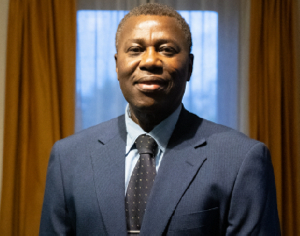Nigerian-British author Irenosen Okojie has been announced as the winner of the 2020 AKO Caine Prize for African Writing for her short story about a Grace Jones impersonator with a dark secret.
Judges praised the "radical" and "risky" work of fiction, which deals with questions of trauma and identity as well as pleasure and escape.
"What I want people to take away from it is not just the pain of tragedy, it's how we reconfigure ourselves past it," Okojie told the BBC.
The London-based writer says her £10,000 ($13,000) winnings will buy her more time to travel, to write and maybe even a garden shed as "a little enclave" to work in.
"I'm predominantly passionate about writing about black women, and for me it doesn't just mean black women from Nigeria," Okojie says. "I think blackness is fascinating, especially cross-culturally."
Wearing a mask
The story, which is called Grace Jones, follows Sidra, a young Martinican woman in London who is wracked with guilt after her whole family dies in a fire that destroys their flat.
In later life she finds a sense of release working as a celebrity impersonator.
Sidra is "hiding under" this mask of Jamaican singer, model and actress Grace Jones, says the author. "But under the character [she] herself is committing dreadful acts."
This leads to a deliberate blurring between the protagonist and her assumed identity.
"Human beings are so fascinating - we cope with things in all sorts of weird and interesting ways. So I wanted to capture a character like that," the author told BBC Focus on Africa radio.
"The psychology of it, you know the idea of hiding behind another character and, you know, how do we cope with the traumas that affect us."
Foreshadowing real life
Some have commented on the uncanny similarities between the fire that engulfs Sidra's childhood home and the 2017 Grenfell tower fire in London, in which dozens of people were killed.
"I'd written it just before Grenfell. It was almost this idea of foreshadowing - sometimes you have an idea that speaks so strongly to you and you don't necessarily know why, and then something happens in the real world that echoes that idea," Okojie told the BBC.
The reality of life under a pandemic is also something the author has channelled into more recent work.
Though there have been times during lockdown when she has felt overwhelmed and "done no writing at all", she sees it as the the role of writers to make sense of the world.
"Sometimes you just want to sit back and process it. We're artists - and if we don't respond in the moment, we will certainly respond post it."
Africa News of Tuesday, 28 July 2020
Source: BBC













